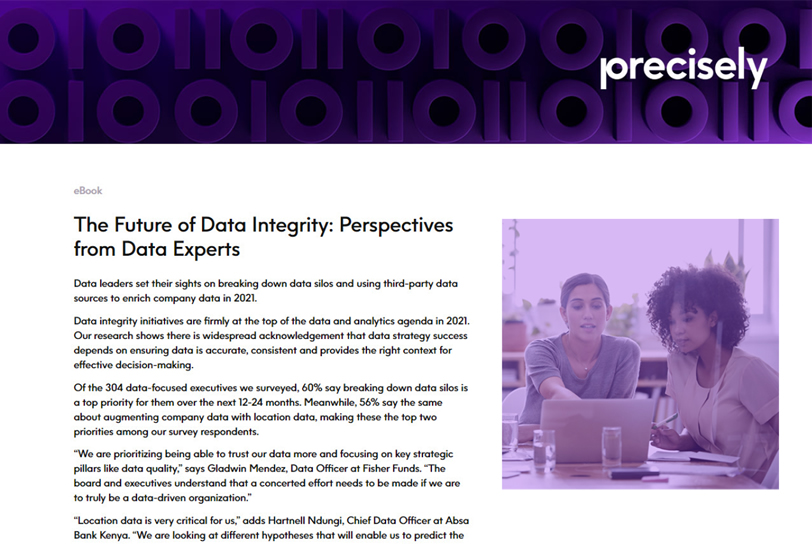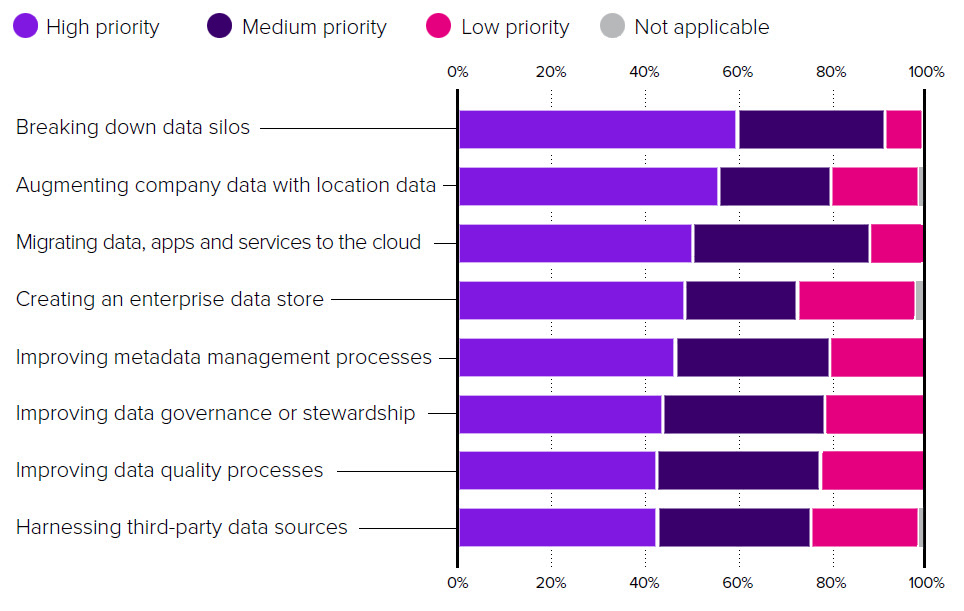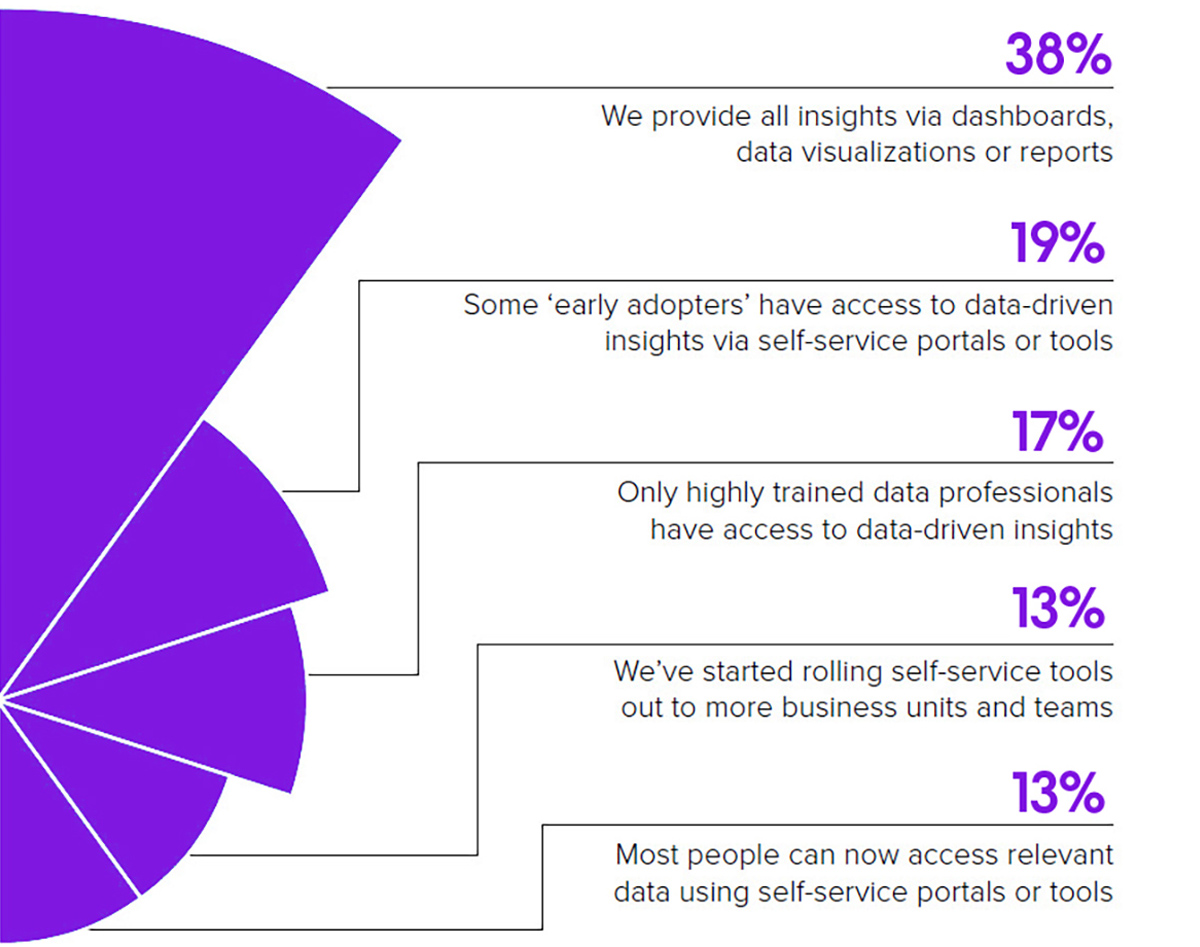eBook
The Future of Data Integrity: Perspectives from Data Experts
Data integrity initiatives are firmly at the top of the data and analytics agenda in 2021. Our research shows there is widespread acknowledgement that data strategy success depends on ensuring data is accurate, consistent and provides the right context for effective decision-making.
Of the 304 data-focused executives we surveyed, 60% say breaking down data silos is a top priority for them over the next 12-24 months. Meanwhile, 56% say the same about augmenting company data with location data, making these the top two priorities among our survey respondents.
“We are prioritizing being able to trust our data more and focusing on key strategic pillars like data quality,” says Gladwin Mendez, Data Officer at Fisher Funds. “The board and executives understand that a concerted effort needs to be made if we are to truly be a data-driven organization.”
“Location data is very critical for us,” adds Hartnell Ndungi, Chief Data Officer at Absa Bank Kenya. “We are looking at different hypotheses that will enable us to predict the usage and behavior of our customers, based on the different regions that they consume our products from.”
Other frequently cited strategic goals include creating an enterprise data store, improving metadata management processes and improving data governance or stewardship processes. Respectively, 49%, 46% and 44% cite these as ‘high priorities’ for their organizations.

“Along with most organizations, we are prioritizing being able to trust our data more and focusing on key strategic pillars like data quality”
Gladwin Mendez Data Officer, Fisher Funds“We cannot afford to drop the ball on data governance and go back to the bad old days,” says Dan Power, MD of Data Governance, Global Markets at State Street. “One of my major goals for the coming year is to get a new data governance coordinating body in place across Global Markets.”
Lastly, 43% of respondents say improving data quality processes and harnessing third-party data sources will be high priorities for them in the coming 24 months.
These findings underscore how crucial maintaining a trusted base of high-integrity data is for driving ROI via data-driven business transformations.

Enriching Data to Provide Decision-Making Context
Context is essential for any kind of decision. Just as a golfer must factor in distance, windspeed and more when lining up a shot, enterprises must ensure they are arming staff with everything they need to make the right decisions as they perform their roles.
For this reason, many enterprises are working to enrich their data with data acquired from third parties.
Our research suggests that a typical enterprise with 2,500+ employees has 27 third-party data sources integrated with the various source systems that exist within its own data architecture, with some having as many as 90.
“External sources play an important part in enriching our data and gaining richer, deeper and more meaningful insights,” says Gladwin Mendez, Data Officer at Fisher Funds. “However, these have to be used in a targeted sense to ensure the value and ROI is always there.”
Enterprise data leaders are facing many challenges as they embark on projects like this. For example, 82% say deploying accessible location data across their enterprises is at least ‘quite challenging’ and 80% say the same about enriching enterprise data consistently at scale.
“When you start looking at different data sources, there are different kinds of correlations that do not mean causation in different use cases,” Ndungi adds. “So, having subject matter experts who are able to know what kind of correlations to create without giving the wrong kind of inference to business is actually also a key challenge.”
Amy O’Connor, Chief Data and Information Officer at Precisely, concludes: “Location is a critical consideration when building data integrity. It’s a common thread found in more than 80% of business data, and thus provides an excellent point for organizing data and drawing insights, such as location-based risk, consumer behavior and more.”
Enterprises are Prioritizing Improving Data Integrity
Please rate the following potential strategic goals as they apply to your data roadmap for the coming 12-24 months.

Source: Corinium Intelligence, 2021
“When you start looking at different data sources, there are different kinds of correlations that do not mean causation in different use cases”
Hartnell Ndungi Chief Data Officer, Absa Bank Kenya
Creating a Truly Data-Driven Enterprise
A truly data-driven business is one where staff and models have access to relevant, high-integrity data and routinely use it to inform their decisions.
Since no enterprise can be staffed exclusively by data scientists, data democratization must play a key role in any company’s data-driven business initiatives. Self-service tools are the best way to get data and insights into the hands of people who can benefit from them.
Yet, our research suggests that just 13% of enterprises with at least 2,500 employees have systems in place that allow most staff to access relevant data using self-service tools. In fact, 55% of respondents say their enterprises have no self-service tools at all and 16% aren’t even providing insights to company stakeholders using dashboards, data visualizations or reports.
“Giving everyone the tools and ability to use and think with data is not the same as getting people to actually do it,” notes Dan Costanza, MD and Chief Data Scientist for Banking, Capital Markets and Advisory at Citi. “That’s why we so heavily focus on individual adopters.”
“We have made sure that we also embed within our data strategy the need to train our business about new and evolving strategies”
Hartnell Ndungi Chief Data Officer, Absa Bank Kenya“Self-service analytics and the democratization of data also calls for training,” agrees Ndungi. “So, we have made sure that we also embed within our data strategy the need to train our business about new and evolving strategies.”
A closer look at the data reveals that software and technology companies are the most likely to report success with their data democratization initiatives.
But these projects are most widespread in financial services and telecoms companies, where roughly 55% of respondents say that at least some ‘early adopters’ can now access self-service portals or tools.
These findings show that, at least in some sectors, data democratization will play a key role in the enterprise of the future.
For data leaders in these industries, ensuring the data that feeds into these tools is high-integrity will prove essential for moving beyond the ‘early adopter’ stage and driving business transformations across the enterprise.

True Data Democratization is Still a Long Way Off
To what extent has data been democratized across your organization?

Source: Corinium Intelligence, 2021
This is an excerpt from our recent report in partnership with Corinium Business Intelligence — Data Integrity Trends: Chief Data Officer Perspectives in 2021.